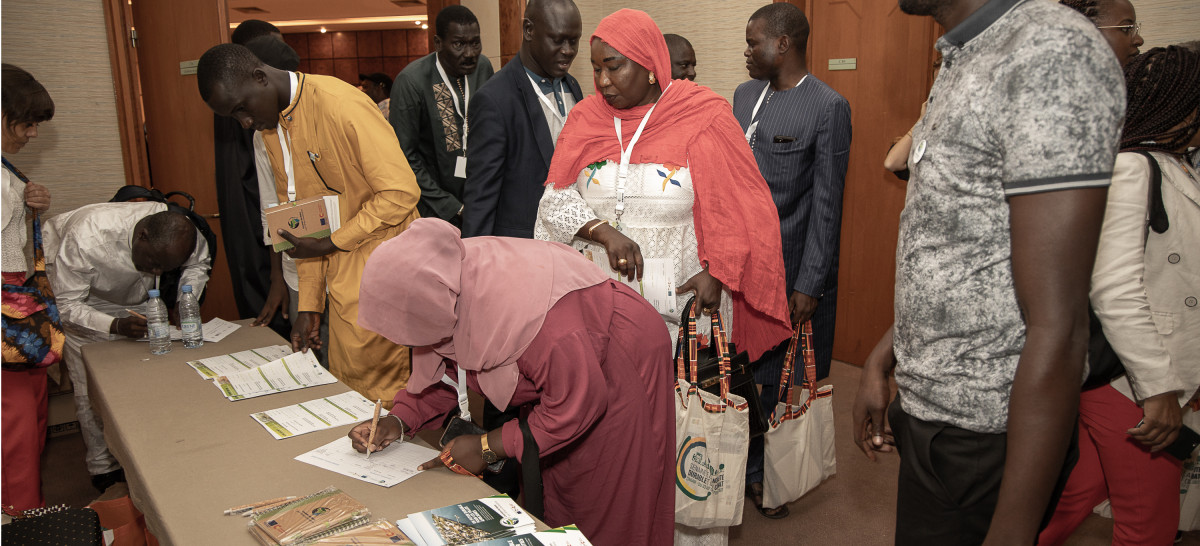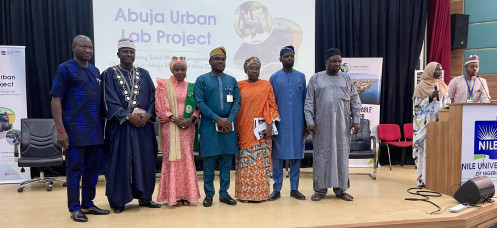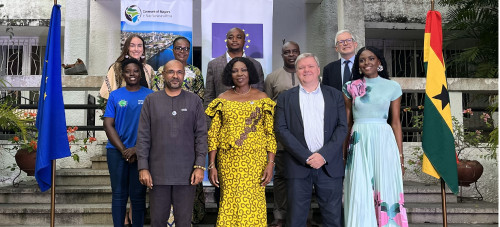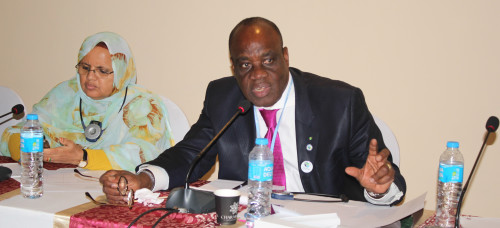PRESS RELEASE: Innovative adaptation approaches needed, urged African cities at CoM SSA Day, ahead of COP27
Published: 5 Oct 2022
Adaptation
Climate Finance
Events
General

Throughout the event, cities made it clear that adaptation actions are at the core of local governments' mandates, that many solutions to adapt to climate change lie in nature, and that the cost of doing nothing is much higher than the cost of their proposed projects.
Dakar, Senegal, 5 October 2022 - The Covenant of Mayors in Sub-Saharan Africa (CoM SSA) through its co-implementing partner the Agencia Española de Cooperación Internacional para el Desarrollo (AECID), hosted over 300 participants from local and national government, civil society, and the private sector at the CoM SSA Day event held during the week for Sustainable Mobility and Climate #SMDC202 in Dakar, Senegal on 4 October.
Named the Pre-COP of African actors ahead of COP27, the week-long conference which is co-organised by CODATU Association, CETUD, and the Climate Chance Association, brought together over 1000 participants from all around the world to Dakar, to focus on adaptation to climate change through energy efficiency and ecosystem-based solutions, with an emphasis on coastal areas.
The CoM SSA Day event reflected on the needs and challenges that local governments face but also presented different experiences and lessons learned by pioneering Sub-Saharan African cities. Yawo Winny Dogbatse, Mayor of Kloto 1 in Togo and Chair of the CoM SSA Regional Mayors Forum, opened CoM SSA day alongside the Spanish Ambassador to Senegal and the CoM SSA Secretariat.
The Spanish Ambassador to Senegal, Olga Cabarga, said that while “mitigation is central to reducing global warming, adaptation to climate change is key to addressing the impacts being felt now. Global warming entails all kinds of risks. Whether it is an increase in the frequency of extreme
weather events such as heat waves, droughts or floods, or coastal erosion due to sea level rise, the impacts will affect everybody”.
weather events such as heat waves, droughts or floods, or coastal erosion due to sea level rise, the impacts will affect everybody”.
Mayor Dogbatse repeated a common message from CoM SSA signatories, that cities in sub-Saharan Africa, which represent 14% of the global population, are hardest hit by the impacts of climate change, but contribute the least to global GHG emissions and only receive 3% of global climate financing.

the Chairman of the CoM SSA Regional Mayor Forum, Mayor of the Commune of Kloto I in Togo Yawo Winny Dogbatse,
the Spanish Ambassador, Olga Cabarga, and the CoM SSA Secretariat Coordinator, Kate Strachan. © CoM SSA
Nonetheless, CoM SSA cities have a bold vision for a sustainable and resilient future and reiterated the need for action and financing of adaptation projects ahead of the COP27 negotiations in Sharm El Sheik, Egypt in November. Throughout the different sessions of the day-long event, CoM SSA cities made it clear that adaptation actions are at the heart of the mandate of local governments and that the cost of doing nothing is way higher than the cost of the proposed projects.
Engineer Solomon Noi, from the City of Accra, emphasised that “cities need to develop actions that deal with issues such as waste management, drought, flooding and extreme heat, these are not projects that will bring profitability to financiers, but they are projects that are needed to improve the lives of our citizens”.
Adaptation and energy efficiency in public infrastructure, and in particular, the construction sector, is at the centre of climate sustainability. Building resilience often requires a combination of hard and soft adaptation measures, as well as engineered and nature-based infrastructure options.
Ernest Dione, from the TyCCAO programme, emphasised that “most of a building's CO2 emission takes place in the production of construction materials. The use of local bio-sourced materials contributes significantly to the storage of atmospheric carbon because it does not involve much transformation”. Some of those materials are locally produced, however, Africa also uses imported equipment. “It is important to implement adequate labelling and quality systems to ensure that only energy-efficient goods enter the African market,” said Monica Maduekwe from ECREE.
Even though African cities lack financing mechanisms for adaptation, they are still taking action because their citizens are already facing the impact of climate change. “In 2017, the degradation of coastal areas had cost the equivalent of 7% of the GDP of Senegal, Côte d'Ivoire, Togo, and Benin. Tidal currents and movement of sediments know no borders and this requires a combined regional approach like CoM SSA does," said Nicolas Desramaut from the World Bank.
The cities of Dakar and Maputo, for example, showcased the innovative approaches they are already taking at the local level. In Dakar, without immediate action, they face between 0.5 - 1 meters of sea level rise per year. In response to this threat, they use dikes to protect against the sea level rise. Maputo is experiencing unprecedented flooding but they are using adaptation measures and nature-based solutions such as mangrove restoration to protect their citizens. “The government is aware of the importance of protecting and restoring mangroves and has defined a national protection strategy to promote sustainable development and contribute to the fight against climate change through actions that also favour of civil society,” declared Cortez Taipo, from Maputo municipality.
The cities of Maputo, Nouakchott and Kisumu highlighted, in one of the sessions, the critical need for participatory processes in planning adaptation and mitigation actions, from mainstreaming gender to including citizens of all ages, from all backgrounds and with different disabilities in all stages of project development. In a joint presentation, Gilda Florentina from the Maputo Metropolitan Area and Loide Atália da Silva Massagaie from the Maputo City Council said, “when planning any project or activity we ask ourselves three key questions, have we considered gender in this decision? is it the same for men & women? and if not, how is it different?”.
Overall, cities demonstrated they are walking the talk by taking immediate and impactful measures, including prioritizing energy efficiency in their municipal buildings and improving access to energy for their citizens.





